An Indiana library board sought to protect kids from books. No one asked what they thought.
The Hamilton East Public Library Board wanted a blueprint, a set of guidelines that could be put into practice in their libraries and others across the country to stop what they viewed as harmful books from sitting on shelves where young people could access them.
The policy, a result of their labors, drew defenders and critics, further exposing divisions in the suburbs where conservative often religious ideologies mix with moderate and progressive beliefs.
For now, the policy has been put on hold. Books removed while the policy was in operation remain in the adult section. And the question remains, how will the library board proceed.
Everybody said they had the best interest of youths at heart.
Parents and board members who favored the policy said they wanted to protect teens from sexually explicit and violent reading materials.
Those opposed to restricting book access said young people and their parents should be allowed to make their own decisions about what to read.
But through it all, nobody truly asked the children.
Such battles are becoming more common in the political realm. Culture wars more often occur in the suburbs than in rural or urban areas because there's a greater diversity of political viewpoints, said Laura Merrifield Wilson, an associate professor of political science at the University of Indianapolis.
"It seems like a thinly veiled proxy war for the larger cultural issues and social conservatism," Wilson said. "It's a way to police, it's a way to infuse values and I think ideologically all sides do that to different degrees."
Protect the children
Sitting together in the library’s teen section one afternoon, teenagers Reva Gooty and Cate O’Malley said they did not hear about the new policy until this summer, months after it was implemented, when author John Green spoke out on social media against the decision to move his book “The Fault in Our Stars.” The high school juniors, who study together regularly at the Fishers library, told IndyStar they didn’t understand why adults want to shield them from reading about violence, sex or things most young adults have heard by their age. “I can see how from the other perspective, it's like ‘Well, I just don't want my children learning about it,’” O’Malley said. “But they don't have to read it if they don't want to because they can keep track of your book records.”
Gooty said she doesn’t find it fair that one side can decide what everyone should do given that some people disagree.
“Lots of parents have different boundaries on what their kids can read and it really varies because lots of people have different religions or different values,” Gooty said. “So I think it's up to the individual parent.”
In a scathing September cover story for Hamilton Southeastern High School’s student newspaper The Orb, three high school juniors decried the library board, saying moving books could harm young readers rather than protect them.
“Removing or relocating books and materials from a publicly owned space can be detrimental to the knowledge of children and adults alike,” the story written by Charlotte Miksha, Nicole Morris, and Lauren Kopka said.
Charlotte Miksha, the first author on the article, is the daughter of Andre Miksha, a HEPL board member who initially agreed to review the collection development policy although he opposed subsequent revisions.
In hindsight, Miksha said speaking for himself, he understands why the policy didn't work. It came from the top down, and those who voted for it didn’t care what teens wanted for themselves.
“One could be troubled by the disjointed rhetoric of parental rights and the responsibilities of parents with the policy that's drawn the way that it is,” Miksha said. “We end up with where there's only liberty granted within the bounds in which the policy writers want to see the liberty granted.”
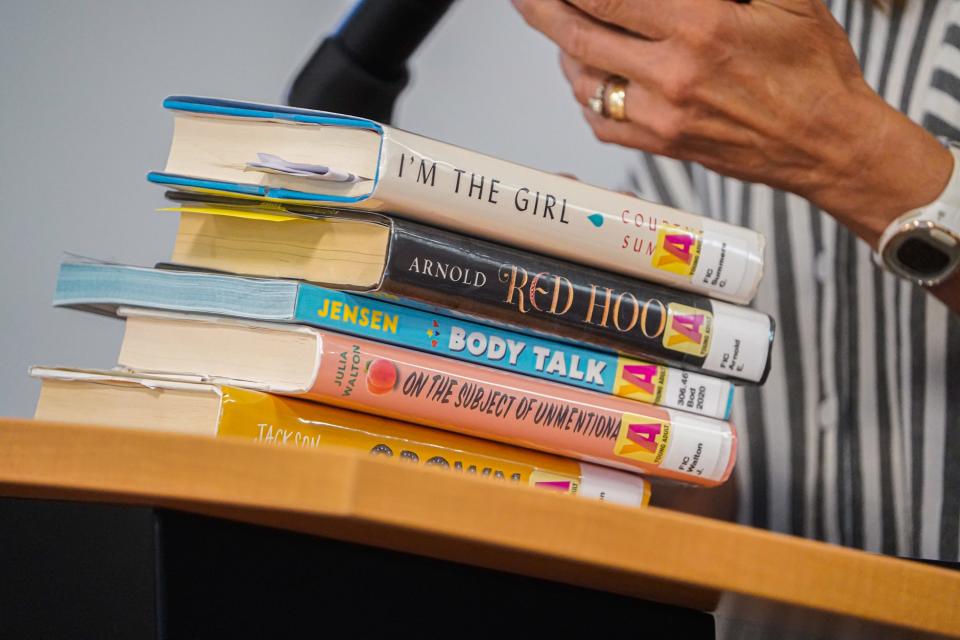
The new policy had little chance of actually keeping teens from reading certain books, the teens said. Both of their high schools, Hamilton Southeastern and Fishers, carry copies of Green’s TFIOS.
If Gooty wants a book from the library she orders it online and picks it up without ever stepping foot in the teen section.
O’Malley said teens are exposed to violence, racism and sexual assault from several sources outside library walls, including social media, news and entertainment.
“I agree that some serious topics are very heavy to burden on people our age because we're still young, obviously, but either way we're gonna be exposed to it,” she said.
The board never consulted the library system’s Teen Advisory Board, which meets monthly, about the policy. Nor has an adult board member ever attended meetings of the group, although some board members requested the teen board’s meeting minutes in August, library staff told IndyStar. However, policies regarding children and teens often are put in place without anyone consulting minors for their input, Wilson said. But in this case, she added, she sees a strong argument for doing so.
Green, who mostly writes young adult fiction, said the library board did a disservice to young readers because teenagers lose valuable perspective so much when they can’t read stories written for their age group.
In the eyes of many advocates, like Green and the American Library Association, any constraints placed on accessing books is equivalent to banning them. While the board insisted that the policy was not about banning books, advocates view the act as censorship.
“There is a chilling effect that accompanies this level of book banning that we're seeing in the United States today,” Green said in late August. “It makes it harder to reach young readers on every imaginable level.”
The start of a fight in Hamilton County
The debate began two years ago when Hamilton County parents discovered "Let's Talk About It: The Teen's Guide to Sex, Relationships, and Being a Human” in the teen section.
Shortly after, a slate of three new conservative members joined Laura Alerding, a Noblesville School Board member, as a majority on the seven-member board throughout 2022.
In 2022 the library moved the offending book, which became the poster child for the movement, to the adult collection. Next, they sought to have more age-inappropriate books reshelved.
Micah Beckwith, a conservative pastor who is running for lieutenant governor, Fishers resident Ray Maddalone and political hopeful Tiffanie Ditlevson, running for city council in Fishers, banded together to develop strict new guidelines to the library’s collection development policy. The policy centers on what books the library should acquire, but the board added appendices on where certain books should be shelved based on what they contain.
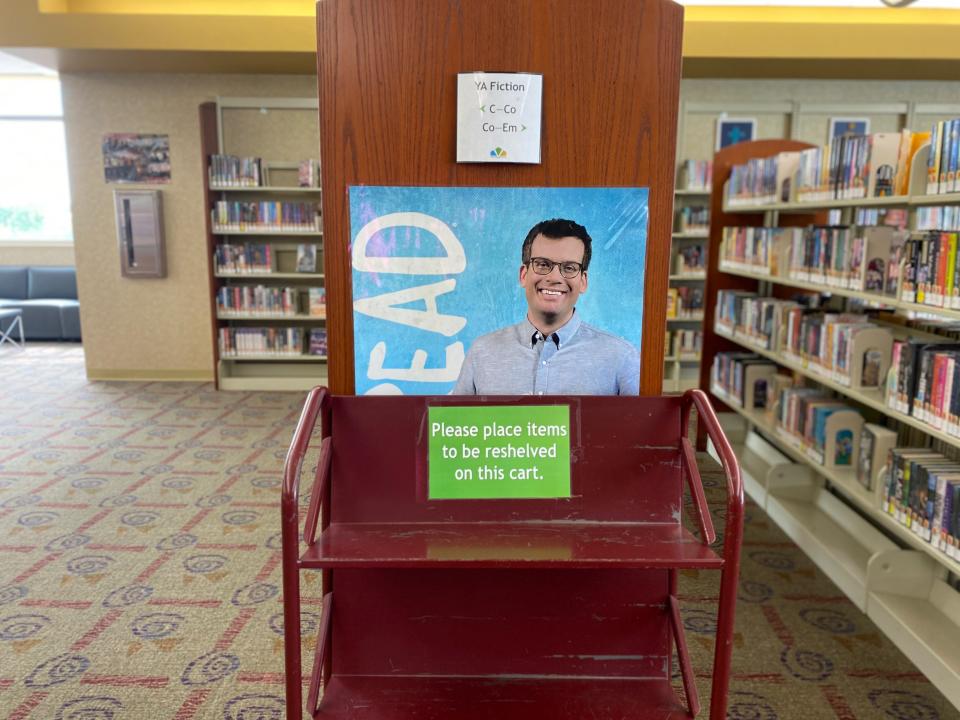
In addition, the board directed library staff to review every book in the teen section.
This brought a storm of attention to the library system with more than 90,000 card-holders, roughly half of the community.
Hamilton County had been a hotspot for conflict before. Most recently, controversies dragged into the Carmel mayoral race and city council races in Fishers.
In retrospect, Miksha said, the board allowed politics to shape the debate and that only fueled the fire.
“You see that in a lot of the local elections and what has been referred to as culture wars and the extent to which certain members of the community want to impose their view of how the community should act and how everybody really should act,” Miksha said.
In December, Beckwith said the board would give library staff grace as they worked through the review.
But in June, staff moved Green’s “The Fault in Our Stars” and all grace was gone. Suddenly what had been a local issue sparked national headlines and the community took notice.
Not just one librarian, library
Through hours of public comment, Edra Waterman, the longtime Hamilton East Public Library director, heard support, disappointment and disgust at the library, the board and the policy.
At public meetings, Waterman was often caught between the board’s demands and her responsibility as a librarian to help the community access the library’s materials.
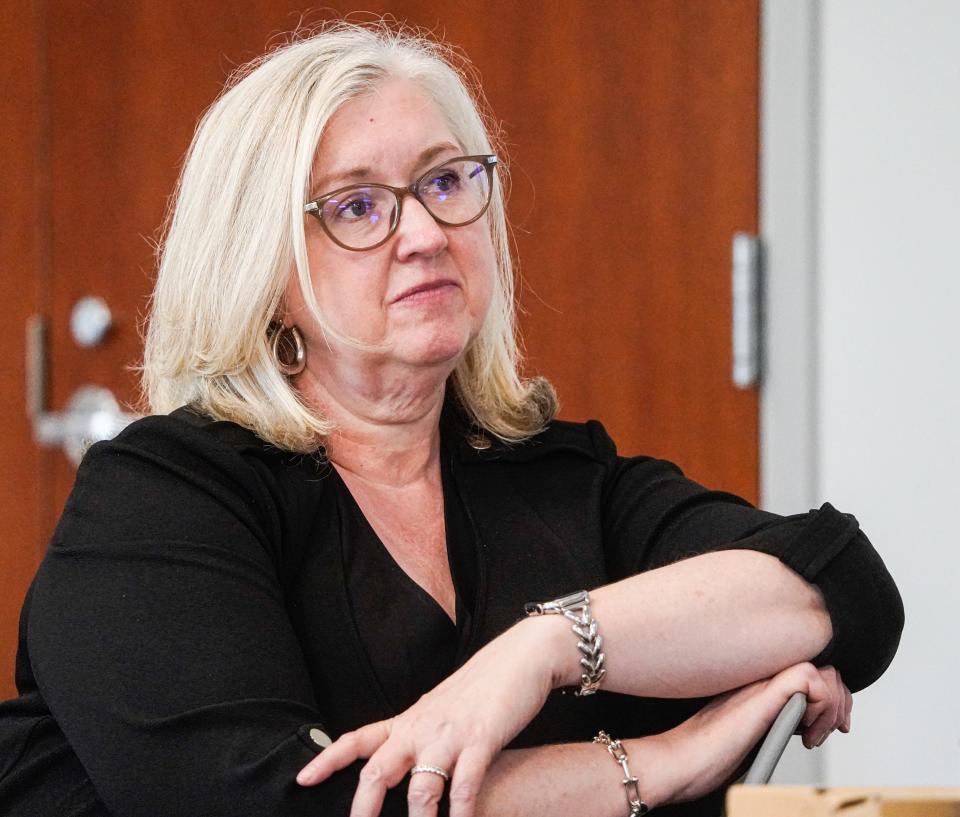
After the public flap over relocating “The Fault in Our Stars,” board president Alerding said library staff mistakenly moved the book.
Rumors then swirled that Waterman had intentionally moved the book and told Green, spurring him to address the policy publicly. The two of them have never spoken, both told IndyStar.
“I found out about the whole thing the same day that I tweeted about it,” Green said.
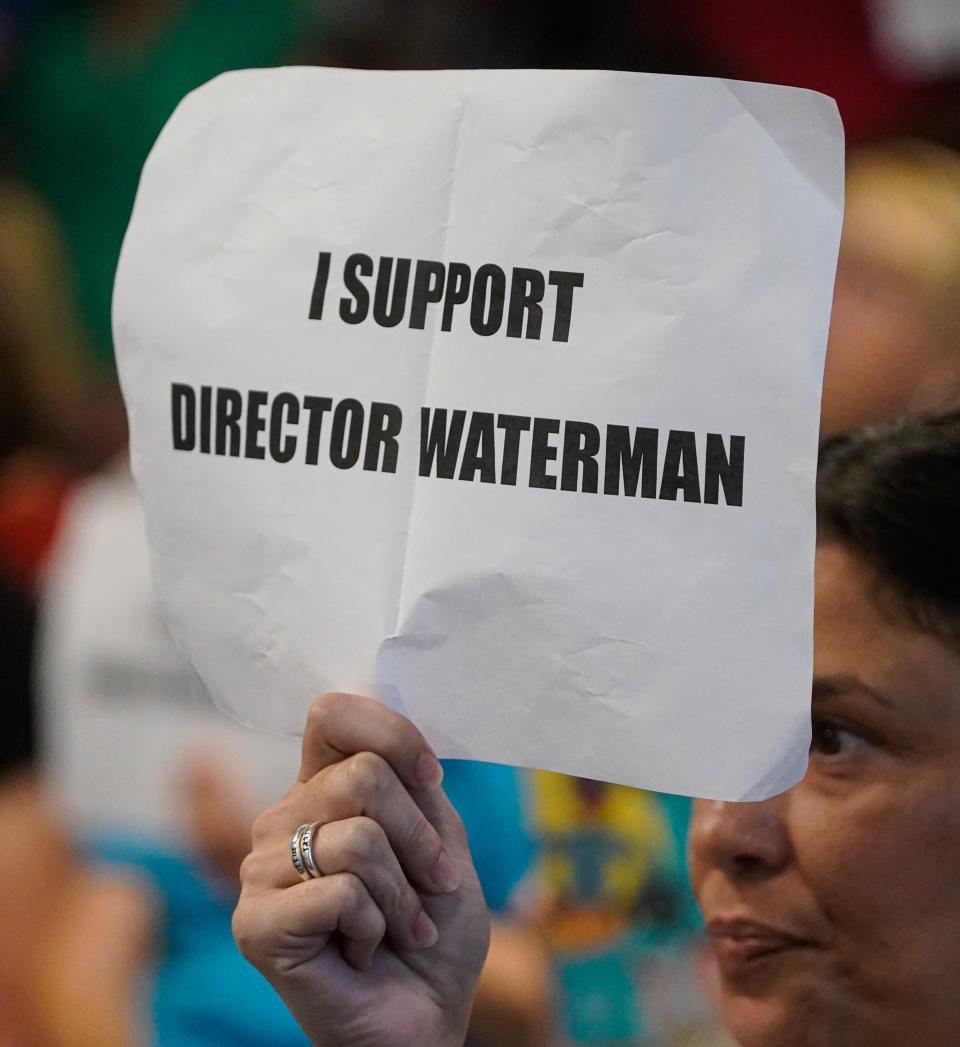
John Helling, former deputy director for the library who left in July, said library staff had no option: TFIOS clearly violated the policy.
“The idea that staff didn't understand the policy is ridiculous,” Helling said. “The idea that the staff intentionally undermined the policy is also ridiculous.”
Over the course of this year, Waterman repeatedly asked for more guidance, often saying that she can’t read board members’ minds.
The board should have never felt surprised that the policy proved controversial, Helling said.
“When a large spotlight shined on this, people were looking for the off ramp and they were looking for a way to deescalate the situation,” Helling said. “It's very convenient to blame people.”
While Waterman said staff sometime monitor the young people perusing the shelves in the two HEPL libraries, library policy clearly states that parents are expected to be aware of what their children are reading.
“Library staff will not monitor or censor your child’s selections,” HEPL’s policies read. “It is your responsibility as a parent to be aware of what your child is checking out.”
In August, the same meeting where board members halted the policy library staff had spent months executing, Waterman let her guard down when a former colleague praised her leadership.
It was a change from often tense conversations with board members. Tears streamed down her face.
Waterman told IndyStar she can work with any board; it’s her job to keep focus on what the board and community members ask her to do.
“As a public library, we're right in the middle,” Waterman said. “We're not here to define for you whether your vision is right for you. We're here to help you get what you need.”
Across the country
The Hamilton East Public Library system librarians were not alone in having to navigate competing ideas about their collection development policies.
Similar battles have arisen in various communities across the country over the last year, primarily in white and affluent suburbs.
Public libraries now account for nearly half of book challenges tallied by the American Library Association. This is a jump from this time last year when public libraries were only responsible for about 16% of challenges to books nationwide with school libraries accounting for the bulk.
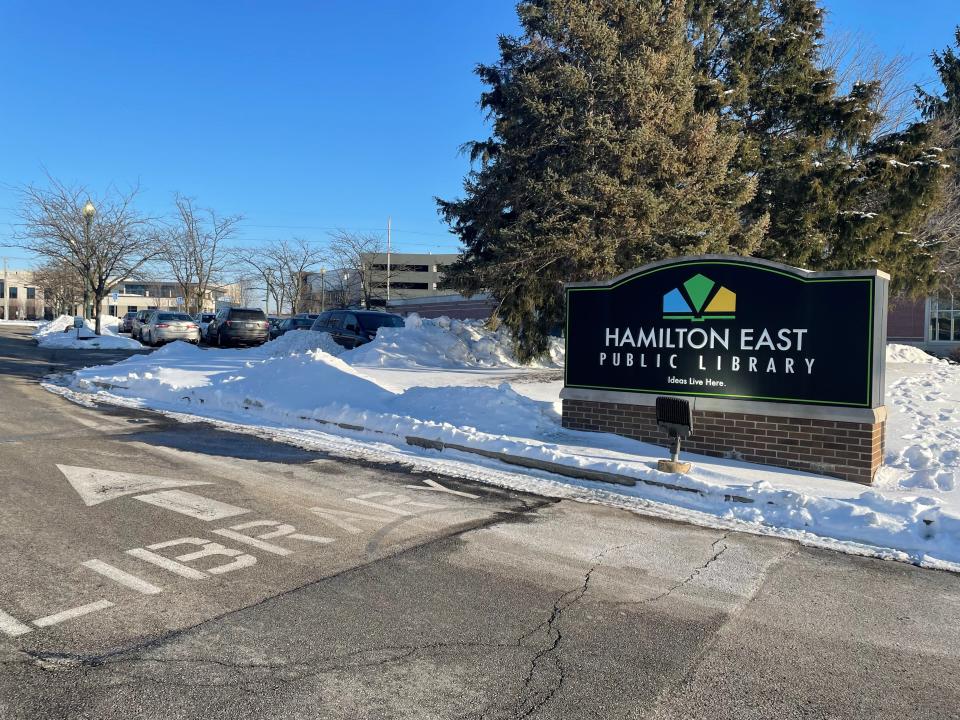
In a PEN America report, the organization, which advocates for book access and freedom of expression, found that a majority of banned or challenged books in the U.S. involved LGBTQ+ themes. Other controversial themes included sex – even heterosexual – and race-related issues.
In a letter to IndyStar, the Kurt Vonnegut Library, which advocates for the late writer’s work and his mission especially book access and free expression, called the parameters to review books a waste of time and money.
At the time the policy paused in August, library staff estimated that they had spent about $60,000 and moved nearly 3,500 titles, according to the library. Completing the review would cost more than $300,000, library staff previously projected.
What happened in Fishers and Noblesville has been done for centuries all over the world, said Alicia Novo, a young adult author and regional advisor for the Indiana chapter of The Society of Children's Book Writers and Illustrators.
Librarians, said Novo, are skilled professionals when it comes to deciding which books are age-appropriate.
Keep coming to the library
Despite the strife of the past year, the library has thrived.
This summer, library staff celebrated the most successful summer reading numbers on record, upgrades are coming along in both main libraries and authors still walk through HEPL’s doors to talk to patrons.
Nor has the community wavered in its support, Waterman said.
“Keep coming to the library,” Waterman said. “Keep coming.”
Those who visit the library may not notice much of a change but the reconfigured board is still weighing how to craft a vision for the future, starting with the collection development policy.
The Noblesville School Board unseated Alerding in August. Two months later, Maddalone resigned hours after the state’s public access counselor ruled he and Alerding violated Indiana’s Open Door Law.
Ditlevson, who initially proudly declared that the decision to move books, rather than remove them, made the board leaders across the country, now serves as president. In August she voted to pause the policy, calling for “a fresh start.”
Meanwhile, Beckwith, who voted to pause the policy, promised supporters in a campaign email he was “not going to back down.”
Some warn the board needs to proceed with caution.
“If we continue down this path, it is not going to end well for us,” Novo told IndyStar. “No society that has banned books ever in history ended in a good place.”
Miksha, who said he is grateful for the policy’s pause, believes the board found humility. The public, he added, has learned that the board is more responsive than they may have thought.
The saga reflects an overall breakdown in civil discourse that has taken place since 2016, he said.
“It's turned into a lack of even respect for your fellow community members,” Miksha said. “In the past, working with people across the aisle in the political sense was not necessarily frowned upon; some people were very good at it and were revered because that's how things got done.”
Meanwhile, the board has yet to formally announce how they plan to hear feedback from the community, something they promised to do in August. Soon they will embark on the library’s strategic plan, which essentially establishes the library’s chosen direction.
This time, teenagers, like the Orb staff and many others, may be paying closer attention to what the board does.
"From governments to social media, censorship is everywhere," the Orb wrote. "The books removed from libraries and the words omitted from stories add up to the information people might never know they are missing."
Rachel Fradette is a suburban education reporter at IndyStar. Contact her at [email protected] or follow her on Twitter at @Rachel_Fradette.
This article originally appeared on Indianapolis Star: HEPL board deemed some books inappropriate. A storm brewed.
Solve the daily Crossword

